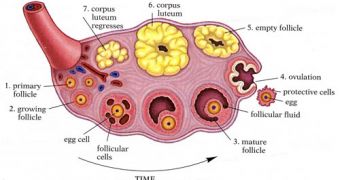Cancer treatment can have severe side effects in a woman: radiation and chemotherapy can stop the function of the ovaries, leading to early menopause, accompanied by osteoporosis, low sex drive and sterility.
But last week, Dr. Sherman Silber, a renowned infertility expert and director of the Infertility Center of St. Louis at St. Luke's Hospital in Chesterfield, Montana, performed a second world's ovary transplant from sister to sister, after performing the same procedure between twins last month.
These surgeries are the first whole-ovary transplants ever done in the United States.
Physicians in China's Zhejiang Medical Science University reported a successful transplant few years ago, but their claim is discarded as they have not published medical literature related to that case.
This type of operation could bring back normal hormone function for women going through early menopause, whether because of cancer treatments or other, unexplained causes. "About 1 % of women naturally experience premature ovarian failure, which leads to early menopause", said Silber. Also, a woman with cancer could freeze an ovary, undergo chemotherapy and radiation, and have her own ovary reimplanted after the therapy.
Both patients are now waiting for the results of their operations to see if the transplants take hold and allow them to ovulate normally.
In 2004, Silber implanted strips of ovarian tissue from a fertile twin into her prematurely menopausal sister and that woman has meanwhile given birth to two children. Since 2004, Silber has performed six other similar operations on twins, but these are the first involving whole ovaries. "All of the twins who have had the ovarian tissue transplants are ovulating and menstruating normally," Silber said. "But the women may get only a few years of ovarian function using the strips of tissue," he said.
A whole ovary with its own blood vessels should be active for decades. "It'll tell us in the field if the entire organ can be successfully retransplanted," said Dr. Pasquale Patrizio - director of the fertility center at Yale University, working on freezing and thawing ovaries to help cancer patients preserve their fertility - about Silber's work.
As the sisters are closely biologically similar, the patients do not require immune-suppressing drugs to prevent organ rejection; but in other situations, doctors are worried what drugs could be prescribed to the mothers-to-be and their babies. "If they're not a close match, we're not ready to tackle that yet," Silber said.
And another issue: the donor sister could go into menopause a few years earlier than she otherwise would have.

 14 DAY TRIAL //
14 DAY TRIAL //